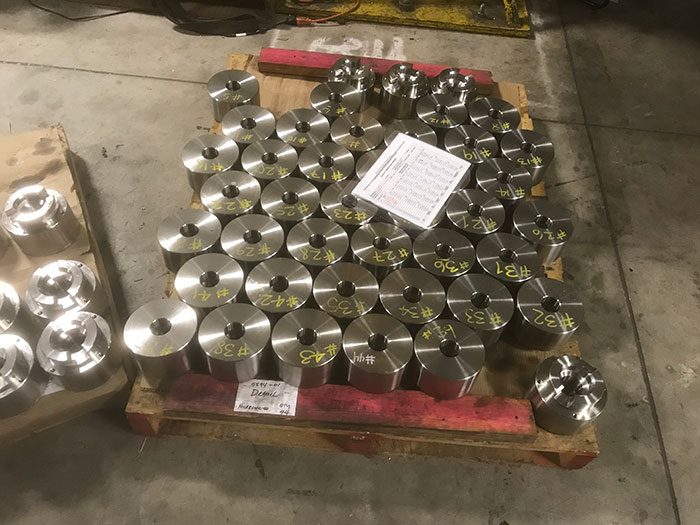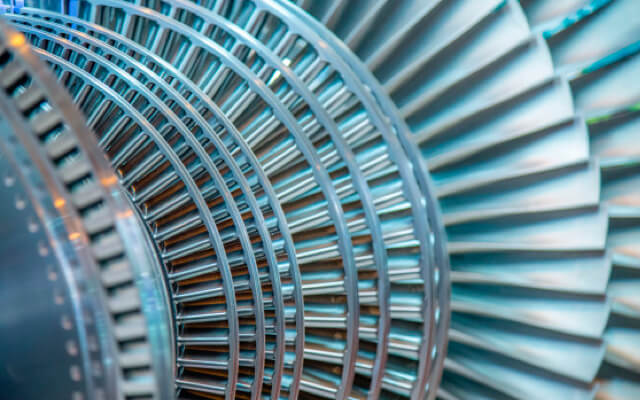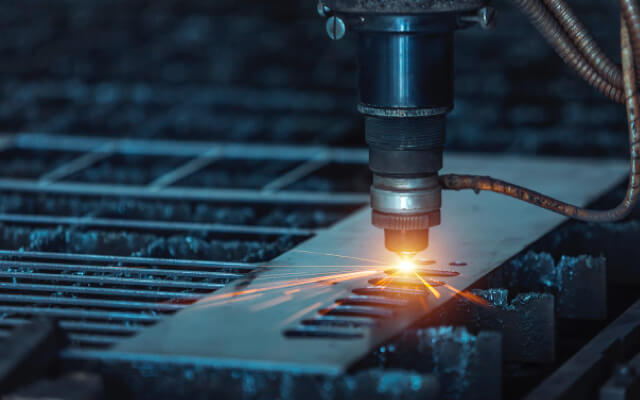Machining is a process in which a material (often metal) is cut into a desired final shape and size by a controlled material removal process. The processes that have this common theme, controlled material removal, are today collectively known as subtractive manufacturing in distinction from processes of controlled material addition, which are known as additive manufacturing. Exactly what the “controlled” part of the definition implies can vary, but it almost always implies the use of machine tools (in addition to just power tools and hand tools). Machining is a part of the manufacture of many metal products, but it can also be used on materials such as wood, plastic, ceramic, and composites. A room, building, or company where machining is done is called a machine shop. All kinds of industries and businesses need quantities of large and small metal or plastic components that may become a part of anything right from an automobile to a zoo. Hence machining services especially which provide customized solutions to businesses have proven to be a boon especially in scaling as well as developing new types of products and designs.
When it comes to producing custom machine parts and designs, custom machine services are very helpful as they provide various faster methods such as milling, turning, EDM, and various others. Specialised custom machine shops are set up for creating parts that do not exist elsewhere and need specialized processes and machines to develop them in a short span of time. In lots of cases, custom machining services are used to make piece parts or large components that encompass several features. Since these parts are customized and ordered for a specific project, they can be heavily biased towards one particular end-use; they do not need to use standardized or universal components. One of the main applications of custom machining service is reverse engineering of parts. Reverse engineering services involve the extraction of existing design information and using it to recreate the machine part. When executed properly, the reverse engineering process will produce a high-quality part that performs to the same standards as an OEM replacement part. In many cases, reverse-engineered machine parts are less expensive than the original OEM alternative.
Custom machining services are especially beneficial for businesses that want to develop non-standard parts which are not available from the suppliers. Businesses that involve various unique features which need mass manufacturing or multiple elements which involve being combined in a single part can definitely benefit from the custom machining services. Custom machining can involve many forms of machining, from manual lathes to 5-axis CNC machining centers, and from prototype plastic machining to accurate metal machining. The machinery required for a particular project depends on the shape and size of the part, as well as the desired material. For some parts, several different cutting tools are required; for others, several pieces of machinery are required too. (For example, a tubular component may be made with CNC turning before further details are added using a CNC mill.)
Speed can be a big factor too. A product designer may be considering several options for their order, and, if the order quantity is on the small side, custom machining services may represent a significantly faster option than alternatives like molding, 3D printing, casting, or sheet metal fabrication, since the setup is fast and simple. The quality and physical properties of machined parts can also entice customers to custom machining over alternative techniques. Custom Machining Services can achieve finer tolerances than processes like 3D printing, and machined parts are often stronger than their molded counterparts since a blank workpiece has been evenly extruded rather than injected into an irregular mold cavity. A business might need fittings, spacers, bushings, shafts, manifolds, dies, fixtures, molds, and any number of other parts. A huge benefit of custom machining is how it not only performs in all kinds of environments, it enhances the business’s overall bottom line by doing the job faster and more cleanly than any other method.
Reverse engineering as explained earlier is one of the specialized applications for custom machining processes. Reverse engineering services involve deconstructing individual components of larger products. The reverse engineering process enables you to determine how a part was designed so that you can recreate it. Companies often use this approach when purchasing a replacement part from an original equipment manufacturer (OEM) is not an option. Businesses often use reverse engineering services on old electronic components, such as discontinued printed circuit boards (PCBs) and connecting cards. Frequently, the products in question will come from manufacturers that have since gone out of business. If the manufacturer is still in business, they might no longer offer the part. When reverse engineering a mechanical product, you start by analyzing the dimensions and attributes of the product in question, be it an aircraft, ship, vehicle, computer, or piece of industrial machinery. During this analysis, you make measurements of the widths, lengths, and heights of key components in the product, as these dimensions often relate to the product’s performance capacity. Today some custom machine shops use 3D scanning technologies to make these kinds of measurements. With three-dimensional scanners, engineers can gain accurate readings of the product’s specs and have this information automatically logged in their databases. 3D scanning technologies include coordinate measuring machines (CMM), industrial computed tomography (CT) scanners, laser scanners, and structured light digitizers.
As technology continues to develop and advance, custom machining services is necessary for the continuity of today’s existing businesses and manufacturing systems. Without custom machining services, businesses would be forced to replace entire machines regularly, investing vast sums of money in the process. Custom machining technology greatly benefits businesses that are keen on implementing it in their manufacturing operations. The custom machine shop works to reduce costs, increase profit, and ensure accuracy, consistency, and precision in the manufacturing processes. Moreover, worker safety can be guaranteed as the complex and harmful tasks are directed to custom machining services. Thus, companies should adopt this technology and consider even employing these services for larger manufacturing work.







